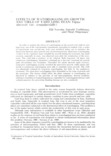In order to analyse the effects of waterlogging on the growth and yield of yard long bean, one of the representative leguminous vegetables in tropical Asia, a series of experiments was carried out. Soils were sterilized before use to minimize the interaction between plant growth and soil microorganisms. Short-term waterlogging (4 days) at the vegetative stage retarded the growth during the treatment, but rapid recovery, especially in roots, was observed soon after the termination of the treatment. The yield had a tendency to be reduced. Both long-term (16 days) and continuous waterlogging (treatment continued up to harvest) restricted the growth until adventitious root formation. Thereafter the plants showed rapid recovery. Long-term waterlogging severely retarded the post-stress growth, while plants subjected to continuous waterlogging were able to maintain active growth. The yield was drastically reduced by long-term waterlogging, but little by the continuous treatment. The short-term waterlogging effect depended on the stage of growth and the genotypes. The factors which affect the plant response to waterlogging are discussed in relation to the activities of soil microorganisms. Several problems relating to breeding of tropical leguminous vegetables for waterlogging tolerance and cultural practices for preventing flooding damage are also considered.

